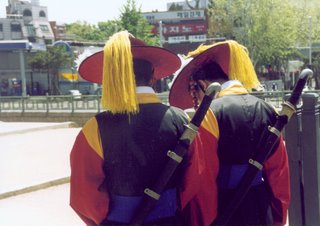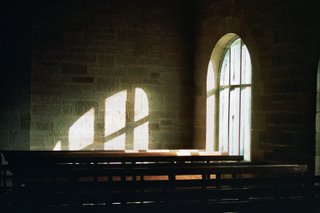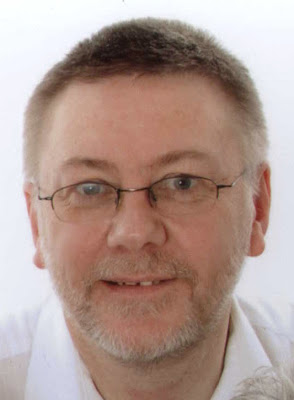
No, this is not the Tartan Army on the way back from the Ukraine! It's a group of Kikuyu people in Kenya, dressed in traditional costume, especially for the tourists. I took the photo four years ago on my first visit to Kenya while staying overnight at the
Outspan Hotel.
I remembered the picture because over the last few days or so our church has had a Kenyan guest. (Julian runs an orphanage near Kikuyu in Kenya which our congregation helps to support.) Although I never actually got round to donning my kilt at any point during Julius' stay he still managed to get in a few light-hearted digs about the Scottish "skirt." And then I remembered that men wearing skirts were not confined to Scotland.
One o

f the places I took Julius to see was the
David Livingstone Centre in Blantyre. The story of this most famous of all Scottish explorers and missionaries never fails to move me, so I am always glad of an excuse to take someone there.
It's a pity that a lot of Scottish people these days hardly know the story- no doubt because Christianity is unfashionable at the moment. But you don't have to be a believer to be amazed at the single-minded commitment and determination of this man, especially to challenge the slave trade. He is someone who really did make a difference. Because he treated other people as if their lives mattered, in the end
his life mattered and was worth something.
If you've never been to see where he was born and to learn about his commitment to Africa, and you can get to Blantyre some time, you should make every effort to do so. (You'll see this impressive sculpture depicting the time he was attacked by a lion.... He lived to tell the tale.)
While I'm talking about heroes... one of my other heroes, of a very different kind, is the Irish fiddler,
Martin Hayes. Strange, you might think, that I should place him alongside David Livingstone. Martin Hayes himself would certainly think so, I'm sure. But there are
some similarities. Well at least one I can think of. When Martin Hayes picks up the fiddle and gets into the groove he has the power to move people really deep down. He touches something in the human spirit that can transport people to another place, another world almost.
I was fortunate to hear him play at a
Fiddle Force Winter School at
Wiston Lodge. There were about forty or fifty of us crammed into the large lounge and when Martin Hayes played he was like a puppeteer pulling all of our emotional strings. (No wonder the Church in Scotland used to be very suspicious of fiddlers!!)
I wrote a short poem about it:
Banishing the wolftones*
With narrowed gaze
and shuffling stare
he crouches low
into the chair
as if in search of something
deep inside himself.
He lifts the fiddle bow,
deliberate
and slow,
to touch a string
that waits to be caressed
back into being.
By his gentle authority
and fierce care,
a tune vibrates
and spirals in the air,
released as some wild bird
into a desolate place.
He is wrapping
precious pearls of silence
with a bright silver foil
of sound,
and offering it to us
as a gift of grace.
I take the gift,
the bait that lures me
into a strange land,
for he has found,
and now ensnared,
my soul.
His awkward body now
unwinds and sways
and breathes
with every phrase,
rocking as a Jew who prays
beside the western wall.
How many centuries of longing
does it take
to form such sounds
that break,
and heal again,
by harmonising
joy and pain?
© 1998 Iain D. Cunningham
*wolftones — name given by fiddlers to the accidental
screeching sound of the bow on the violin strings
Written after hearing the Irish Fiddler, Martin Hayes,
playing at Fiddle Force Winter School 98, Wiston Lodge
 Like the outfits?
Like the outfits?




